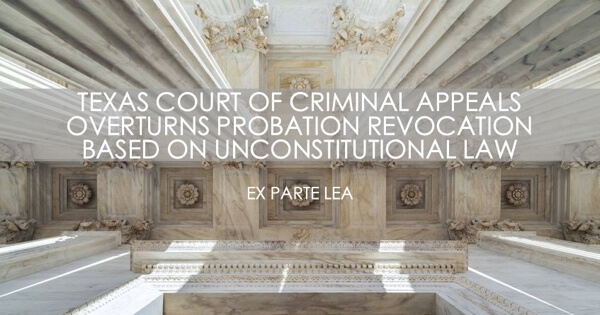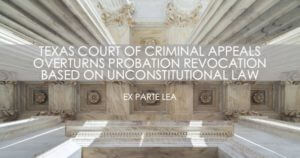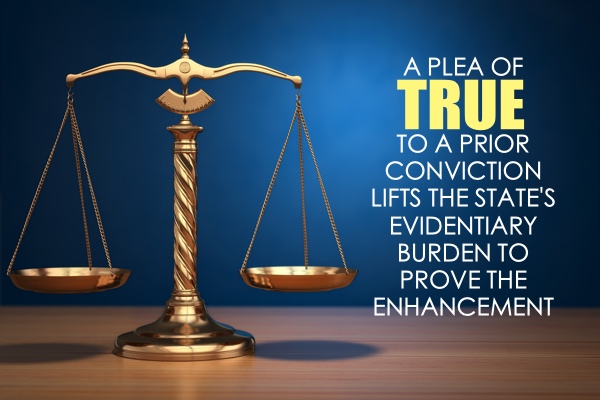
Punishment for a Man Convicted of Child Pornography Held Facially Unconstitutional
Ex Parte Lea (Tex. Crim.App. 2016)
 What happens when an old criminal law is rendered null and void? Do people convicted of such crimes get to walk free, or, are the convictions upheld in the interests of justice? The Texas Court of Criminal Appeals (“CCA”) filed an ex parte case (the court filed the case on its own volition) to determine whether David Lea’s punishment for his 2008 child pornography conviction should be set aside on constitutional grounds. The case was met with a dissent by Judge Yeary and the CCA reached a very interesting conclusion.
What happens when an old criminal law is rendered null and void? Do people convicted of such crimes get to walk free, or, are the convictions upheld in the interests of justice? The Texas Court of Criminal Appeals (“CCA”) filed an ex parte case (the court filed the case on its own volition) to determine whether David Lea’s punishment for his 2008 child pornography conviction should be set aside on constitutional grounds. The case was met with a dissent by Judge Yeary and the CCA reached a very interesting conclusion.
In 2008, David Lea pled guilty to three counts of possession of child pornography. As a result, he was sentenced to twelve years’ imprisonment, ten of which were probated by way of community supervision. In 2012, Lea pled guilty to one count of improper visual photography and received a state-jail felony sentence of two years confinement. During sentencing, the State filed a motion to revoke Lea’s community supervision from the 2008 conviction because, the State argued, Lea violated the terms of his supervision by committing a new criminal offense. Accordingly, the court revoked Lea’ s probation and Lea was sentenced to six years imprisonment.
The Offense of “Improper Photography” Held Unconstitutional
In 2014, the CCA held that the offense of improper photography was “facially unconstitutional” because it infringed upon individuals’ First Amendment rights, as propounded by the Constitution of the United States. The main issue? The improper photography statute, once found in Section 21.15(b)(1) of the Texas Penal Code was overbroad. Ex Parte Thompson, 442 S.W.3d 325 (Tex. Crim. App. 2014).
Lea Files Writ to Overturn His Conviction for the Stricken Law
Lea filed a Writ of Habeas Corpus, arguing that because the offense of improper photography was found unconstitutional, (1) his sentence for improper visual photography should be vacated and (2) his original probation via community supervision should be reinstated.
When an old law is found to be unconstitutional on its face, it is considered to be “void from its inception and should be treated as if it never existed.” Smith v. State, 463 S.W. 3d 890, 895. The due process right to not be convicted under a statute that has been declared void cannot be forfeited. Ex Parte Fournier, 473 S.W.3d 789, 796 (Tex. Crim. App. 2015).
CCA Overturns Lea’s Prior Conviction and Revocation
When Lea was originally sentenced in 2008, the CCA had not yet determined the fate of the improper photography statute. And while it’s true that courts may revoke community supervision based upon a violation of community supervision conditions—committing any future crimes in this case—the Court finds that Lea’s conviction must be set aside. “The harm here flows from his void conviction, namely, the revocation of his community supervision based solely on an offense that [in theory] never existed.”
Accordingly, the CCA set aside the revocation of Lea’s community supervision, and remanded the case to the trial court to determine reinstatement of his probation. It is important to note that Justice Yeary dissented in this case, referring to Fournier, “I do not believe the applicant should be able to obtain retroactive post-conviction collateral relief based upon an overbroad statute unless he can show that the statute was unconstitutional as to his own conduct. 473 S.W. 3d 789, 805 (Tex. Crim. App. 2015). Yeary believes that post-conviction relief should only be granted to those defendant-applicants who can show that the conduct in question did not fall within the “plainly legitimate sweep of the overbroad statute.”


 What happens when the State omits the year of an offense on a legal document presented before the court for a sentencing enhancement? Well, nothing, so long as the defendant pleads “true” to the priors and the enhancement itself is not improper, according to the latest holding from the Court of Criminal Appeals. The CCA revisits Roberson v. State to explain why it comes to this quirky conclusion.
What happens when the State omits the year of an offense on a legal document presented before the court for a sentencing enhancement? Well, nothing, so long as the defendant pleads “true” to the priors and the enhancement itself is not improper, according to the latest holding from the Court of Criminal Appeals. The CCA revisits Roberson v. State to explain why it comes to this quirky conclusion.





